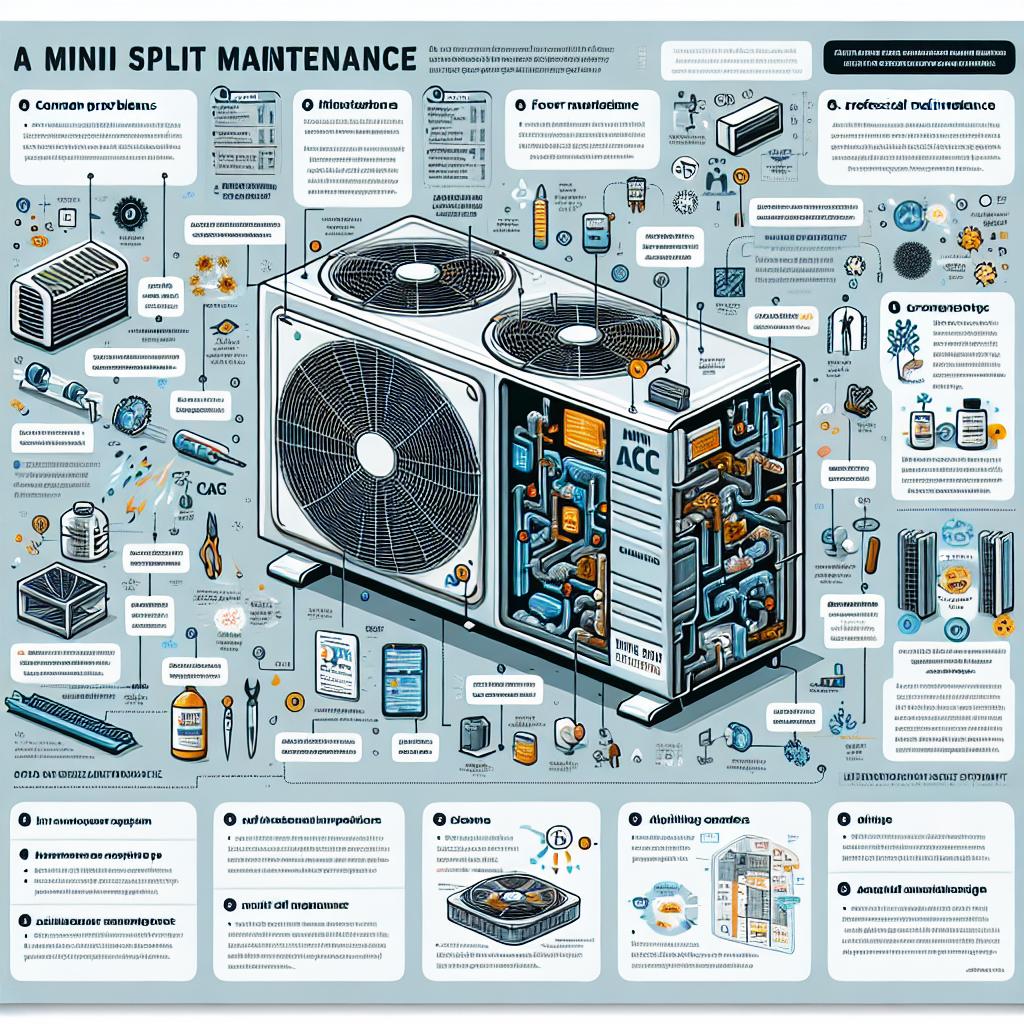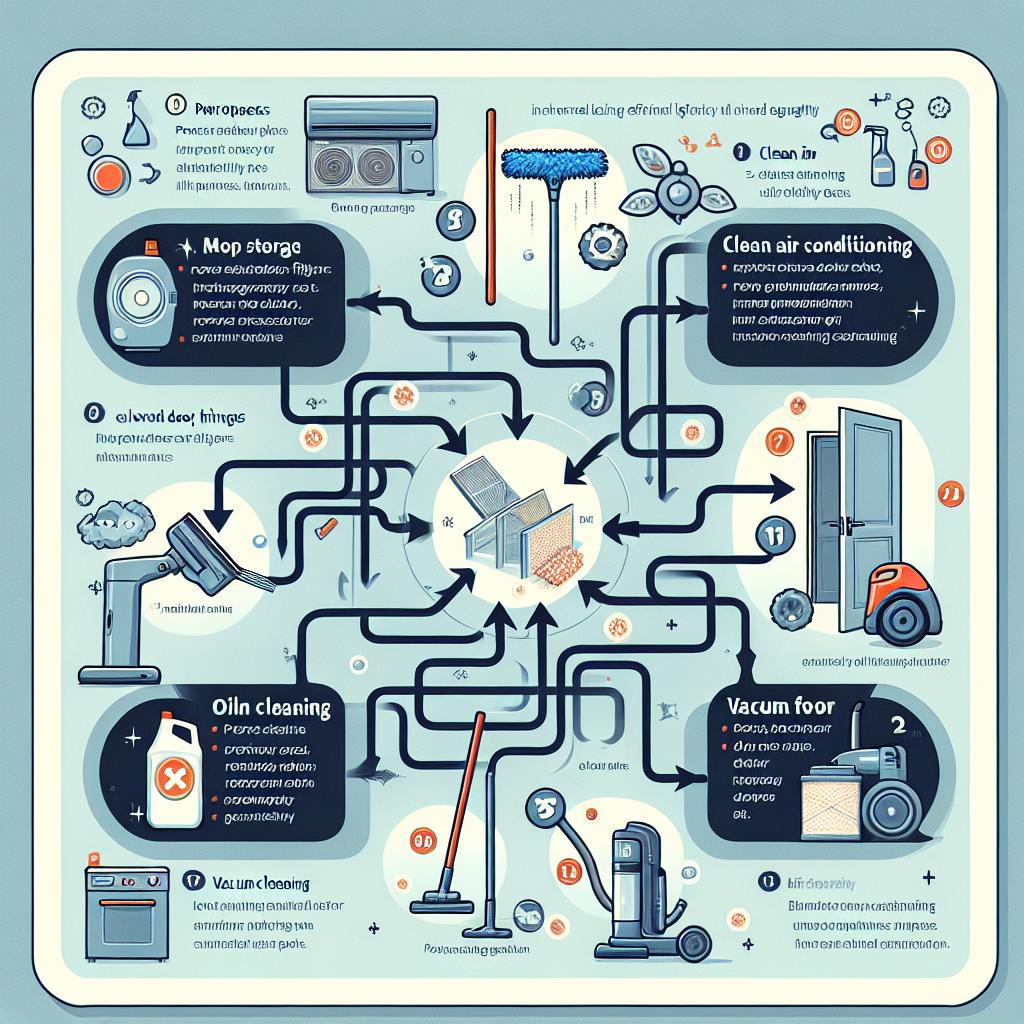As the temperature rises and the demand for comfort escalates in commercial spaces, mini split air conditioning systems have emerged as a popular choice for efficient climate control. Unlike traditional HVAC systems, these compact units offer flexibility and targeted cooling solutions, making them ideal for diverse environments—be it a bustling cafe, a serene office, or an expansive retail space. However, the true potential of mini split systems can only be realized with regular maintenance. In this article, we’ll explore the common maintenance practices that ensure these systems operate at peak efficiency, delivering cool relief when it’s needed most. From simple cleaning techniques to more intricate inspections, understanding these practices is essential for business owners and facility managers looking to enhance comfort while extending the lifespan of their investment. Join us as we delve into the essential steps for keeping your mini split AC running smoothly and effectively within your commercial space.
Understanding the Importance of Regular Maintenance for Mini Split AC Systems
Mini split AC systems are a popular choice for commercial spaces due to their energy efficiency and flexibility. However, just like any other HVAC system, they require regular maintenance to ensure optimal performance and longevity. Neglecting maintenance can lead to reduced efficiency, higher energy costs, and even complete system failure. By conducting routine checks and cleaning, businesses can protect their investment and maintain a comfortable environment for both employees and customers.
To keep mini split AC systems functioning at their best, it’s essential to practice regular maintenance routines. Here are some effective maintenance practices:
- Regular Filter Cleaning: Clogged filters impede airflow and reduce efficiency.
- Coil Cleaning: Dust and debris on evaporator and condenser coils can hinder heat exchange.
- Drain Line Inspection: Keep the condensate drain line clear to prevent water damage.
- Electrical Connections Check: Inspect connections for wear or loose wiring to prevent electrical issues.
Implementing these practices can extend the lifespan of a mini split AC system while promoting energy efficiency. Consider creating a maintenance schedule tailored to your business’s specific needs, ensuring that these important tasks are completed consistently.
| Maintenance Task | Frequency |
|---|---|
| Clean/Replace Filters | Monthly |
| Inspect Coils | Quarterly |
| Clean Drain Line | Twice a Year |
| Check Electrical Connections | Annually |

Essential Cleaning Tasks to Enhance Efficiency and Longevity
Maintaining the effectiveness of mini split AC systems in commercial spaces requires a commitment to cleanliness that goes beyond the occasional dusting. Clearing debris around the outdoor unit is crucial; it allows for optimal airflow and prevents the system from overheating. Additionally, regularly cleaning the air filters every month can significantly enhance the unit’s performance by ensuring unimpeded airflow. A buildup of dust and dirt can force the system to work harder than necessary, leading to premature wear and inefficiency.
Incorporating thorough coil cleaning into your maintenance routine is vital to extend the lifespan of your mini split system. When dirt accumulates on the evaporator and condenser coils, it reduces heat exchange, which can raise energy costs and degrade system performance. Scheduling professional inspections and maintenance every six months enhances operational efficiency and ensures that all components are functioning properly. Check out the table below for a quick overview of key cleaning tasks associated with mini split AC systems:
| Cleaning Task | Frequency | Importance |
|---|---|---|
| Clear outdoor unit debris | Monthly | Prevents overheating |
| Clean air filters | Monthly | Enhances airflow |
| Clean coils | Every 6 months | Improves heat exchange |
| Inspect electrical components | Annually | Ensures safety and functionality |
Key Performance Indicators to Monitor During Routine Inspections
When conducting routine inspections of mini split AC systems, it’s crucial to keep an eye on specific performance metrics to ensure efficiency and longevity. Monitoring energy consumption can help identify anomalies that might indicate issues such as refrigerant leaks or component failures. Additionally, tracking airflow rates can reveal whether filters or ducts are blocked, potentially hindering system performance. Regularly checking temperature differential, which measures the difference between indoor and outdoor air temperatures, is an excellent way to gauge system effectiveness and verify that it operates within the manufacturer’s specifications.
Furthermore, system run time is another significant KPI, as it provides insight into how often and effectively the unit operates. A high run time may suggest that the system is struggling to maintain desired indoor temperatures, indicating the need for maintenance. Utilizing a simple table format can help in summarizing these KPIs for easy tracking:
| KPI | Target Level | Notes |
|---|---|---|
| Energy Consumption | Within 10% of baseline | Monitor for variances |
| Airflow Rate | As per manufacturer specs | Check filters regularly |
| Temperature Differential | 18°F – 22°F | Optimal cooling performance |
| System Run Time | 3-5 hours per day | High may indicate issues |

Best Practices for Scheduling and Documenting Maintenance Activities
Scheduling maintenance activities for mini split AC systems is crucial in ensuring optimal performance and longevity. One effective strategy is to establish a regular maintenance calendar that aligns with seasonal changes and facility usage. Consider the following tips to streamline the process:
- Frequency: Schedule inspections at least twice a year—before the cooling and heating seasons.
- Reminders: Use digital tools or calendar apps to send notifications ahead of the due dates.
- Staff Training: Educate maintenance staff on the importance of adherence to the schedule.
Documenting maintenance activities is just as important as scheduling them. A well-maintained record can help track the performance, predict future needs, and facilitate conversations with HVAC professionals. Consider implementing a logbook system for this purpose:
| Date | Task Performed | Staff Responsible | Comments |
|---|---|---|---|
| 01/10/2023 | Filter Replacement | John Doe | Filters were clogged, performance improved. |
| 01/15/2023 | System Check | Jane Smith | All components functioning normally. |
Utilizing such documentation not only ensures that maintenance keeps up with demand but also helps in planning future budgets and repairs effectively.
Q&A
Q&A: Common Maintenance Practices for Mini Split AC Systems in Commercial Spaces
Q1: What is a mini split AC system, and why is it popular in commercial spaces?
A1: A mini split AC system is a type of air conditioning system that consists of an outdoor compressor unit and one or more indoor air handling units. Its popularity in commercial spaces stems from its flexibility, energy efficiency, and ability to provide zoned cooling, allowing businesses to customize temperature settings in different areas without the need for extensive ductwork.
Q2: How often should I schedule maintenance for a mini split AC system?
A2: Maintenance should ideally be performed at least twice a year—once before the cooling season begins in spring and again before winter, especially if the system also provides heating. This proactive approach ensures optimal performance when you need it most, avoiding potential breakdowns during peak usage times.
Q3: What are some basic maintenance tasks that can be done by staff in commercial spaces?
A3: There are a few simple tasks staff can handle:
- Cleaning or replacing filters: Dirty filters can restrict airflow and reduce efficiency. Checking them monthly and cleaning or replacing them as needed can improve performance.
- Checking the outdoor unit: Ensuring the area around the outdoor condenser is free from debris, leaves, and dirt allows for adequate airflow.
- Inspecting the drain line: Clearing any obstructions in the drain line prevents water damage and maintains proper moisture removal.
Q4: Should I hire a professional for maintenance? If so, what specific services do they provide?
A4: Yes, hiring a professional is recommended for a thorough inspection and maintenance check. Professionals typically provide services such as:
- Detailed cleaning of evaporator and condenser coils to enhance heat exchange.
- Checking refrigerant levels to ensure the unit is operating efficiently.
- Inspecting electrical connections and components for safety and longevity.
- Testing thermostat accuracy and ensuring proper calibration.
Q5: What signs indicate that a mini split AC system may need immediate attention?
A5: Be vigilant for these warning signs:
- Unusual noises or vibrations coming from the unit.
- Inconsistent cooling or heating across different zones.
- Increased energy bills without any changes in usage behavior.
- Water leaks or excessive moisture around the indoor unit.
If you notice any of these issues, it’s best to call a professional as soon as possible.
Q6: Can regular maintenance help extend the lifespan of my mini split AC system?
A6: Absolutely! Regular maintenance not only enhances efficiency but also prolongs the life of your mini split AC system. By catching and addressing small issues before they escalate, you can avoid costly repairs and ensure that your system continues to perform optimally for years to come.
Q7: What are the benefits of having a well-maintained mini split AC system in a commercial environment?
A7: A well-maintained mini split AC system can lead to numerous benefits, including:
- Improved energy efficiency, resulting in lower utility costs.
- Enhanced indoor air quality, supporting the health and comfort of employees and customers.
- Increased reliability, reducing the chances of unexpected breakdowns during crucial business hours.
- Better temperature control, allowing for a more pleasant and productive work environment.
Q8: Are there any common misconceptions about mini split AC systems and their maintenance?
A8: One common misconception is that mini split systems require little to no maintenance due to their compact design. While they may be easier to manage than traditional HVAC systems, neglecting regular care can lead to inefficiency and costly repairs. Proper maintenance is essential for keeping them in good working condition.
By understanding these common maintenance practices and the importance of regular servicing, commercial space owners can ensure that their mini split AC systems are operating efficiently, effectively, and reliably, creating a comfortable environment for everyone.
Key Takeaways
maintaining mini split AC systems in commercial spaces is not just a matter of comfort, but a vital investment in efficiency and longevity. By adopting these common maintenance practices—such as regular cleaning of filters, monitoring refrigerant levels, and scheduling professional inspections—you can ensure that your system operates at peak performance, ultimately leading to enhanced air quality and reduced energy costs. Remember, proactive maintenance today can prevent costly repairs tomorrow. As you navigate the bustling routine of business operations, let these practices serve as your guide to an optimal climate, fostering a productive and pleasant environment for both employees and customers alike. Embrace the cool, for in the realm of air conditioning, consistency is key.

